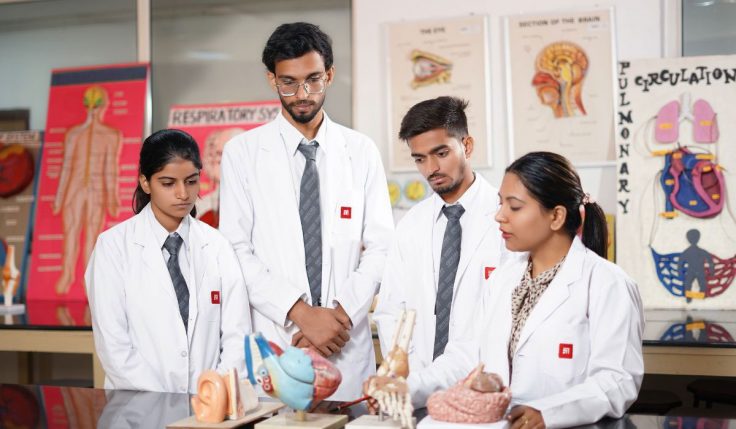In the fast-paced modern world, the intersection of nutrition cannot be overstated. As our lives become busier and more demanding, it is easy to neglect our dietary choices and choose convenience over nutrition.
The impact of what we eat goes way beyond satisfying our hunger. It plays an extremely important role in nourishing our bodies and minds. In simple words, the food we eat can affect our state of mind considerably while calming feelings of anxiety and uneasiness.
While many individuals center around the significance of sustenance for human bodies, it also impacts our psychological wellness. In this blog, we will see how the role of nutrition helps to nourish our body and mind. Keep reading to learn more.
Ways in Which Role of Nutrition Nourishes Our Body and Mind
Adequate Nutrition
Specific supplements such as Omega-3 unsaturated fats, nutrients B6, B12, and folate largely impact our temperament. Researchers have linked a lack of any of these supplements to a higher probability of encountering negative state-of-mind problems.
To induce a sound state of mind, incorporate different organic products, including vegetables, whole grains, and lean proteins, into your everyday eating regimen to ensure you get an adequate number of supplements.
Mental Prosperity
Tons of microscopic organisms, known as gut microbiota, inhabit our stomach and vastly affect our psychological well-being. The association between the stomach and brain, called the gut-brain axis, affects our stress, temperament, and nervousness.
Eating a diet rich in fibre, probiotics, and prebiotics ensures that you have a solid stomach microbiome which can help in making sure that you have mental prosperity.
Maintaining Glucose Levels
The food varieties that we eat can vastly impact our glucose levels. Consequently, this can also influence our feelings of anxiety. Eating sweet or vigorously handled food sources can quickly raise and lower glucose levels, which causes enhanced pressure.
On the other hand, eating complex carbs such as whole grains and vegetables along with solid fats. And proteins can help with settling glucose levels and developing mental balance.
Fuelling the Body
Healthy food is the primary fuel for the human body. It offers the essential nutrients and energy required for optimal functioning.
Therefore, a well-balanced diet consisting of fruits, vegetables, whole grains, proteins, and healthy fats is capable of supporting various bodily processes.
With nutritious food, you can ensure a healthy metabolism, immune function, and organ health. Healthy food offers proper nourishment, which helps in preventing nutritional deficiencies and also enhances physical performance while boosting stamina.
Role of Nutrition in Maintaining Healthy Body Weight
One of the most significant benefits of healthy eating is maintaining a healthy body weight. Obesity and weight related issues have become prevalent concerns in the present society.
By choosing nutritious food and practising portion control, it is possible to achieve and also sustain a healthy body weight. Consequently, this helps in reducing the risk of chronic medical conditions such as heart disease, diabetes, and joint problems.
Strong Immune System
A robust immune system is important for defending the body against infections and illnesses. Nutrient-dense foods, including those packed with Vitamin C, D, and Zinc improve the immune response.
As a result, with a strong immune system, human beings become less susceptible to common illnesses such as colds and flu.
A well-nourished body is better equipped to combat infections and recover faster.
How Does Doing B.Sc. (Hons.) Nutrition & Dietetics Help in Understanding the Role Of Nutrition in Nourishing Body and Mind?
Embarking a B.Sc. in Nutrition and Dietetics is a profound exploration into the pivotal role nutrition plays in nourishing the body and mind. This program is an educational journey that offers a multifaceted understanding of the relationship between food, nutrients, and health. This is how this degree ensures a deeper comprehension of the role of nutrition in nurturing the body and mind.
Foundation in Biological Science
The curriculum of this program includes foundational courses in subjects such as Biology, Chemistry, and Physiology. It has a grounding in the basic sciences that provides students with important knowledge of Human Anatomy, Metabolism, and Cellular processes. Gaining a detailed understanding of these subjects ensures you understand how the role of nutrition supports vital functions, including energy production and immune defense.
Nutrient Biochemistry and Metabolism
The program includes biochemical pathways involved in nutrient digestion, absorption, and metabolism. It explores the roles of macronutrients and micronutrients in cellular processes and metabolic reactions. By understanding the intricate biochemical mechanisms underlying nutrient utilisation, students can gain insights into optimising dietary choices that promote optimal health and well-being.
Nutritional Analysis
The program offers students tools and techniques that are important for assessing dietary intake, nutritional status, and health outcomes. With coursework and practical experiences, students can learn to conduct comprehensive nutritional assessments using methods like dietary recalls, food diaries, and anthropometric measurements as well. Gaining this proficiency allows graduates to find nutritional deficiencies, assess dietary patterns, and formulate evidence-based recommendations for addressing nutritional needs.
Dietary Patterns and Behaviours
B.Sc. Nutrition and Dietetics explores many factors like cultural, social, and psychological influencing dietary patterns and food choices. Students can examine the impact of socioeconomic status, cultural norms, food marketing, and environmental influences as well. By really understanding the interplay between these factors, graduates can be equipped to develop culturally sensitive nutrition interventions for promoting healthy eating habits.
Disease Prevention
The program also examines the role of nutrition in the prevention and management of chronic diseases, including diabetes, obesity, cardiovascular diseases, and cancers. Students can explore epidemiological evidence, clinical trials, and public health strategies aimed at reducing disease risk with dietary interventions and lifestyle medications.
Psychological and Emotional Aspects
Other than psychological factors, B.Sc. Nutrition & Dietetics delves into the psychological and emotional aspects of eating behaviour. Students are made to explore topics such as food cravings, emotional eating, body image, and disordered eating patterns. By learning more about the psychological determinants of food choices and eating patterns, graduates can address issues and develop customised interventions to support individuals in creating a healthy relationship with food.
Also, read this blog post: Exploring the Dynamic Field of Nutrition and Dietetics
Pursuing a B.Sc. (Hons.) Nutrition and Dietetics offers a comprehensive exploration of the role of nutrition in nourishing the body and mind. With a combination of practical experience, scientific knowledge, and social awareness, students can develop the knowledge required to address nutritional challenges and promote well-being.
Chitkara offers one of the best B.Sc. (Hons.) Nutrition & Dietetics programs and helps students make meaningful contributions to improving nutritional outcomes and enhancing the quality of life for individuals. If you are someone interested in understanding how the role of nutrition plays an important role in nourishing the mind and body, then this program is for you.






